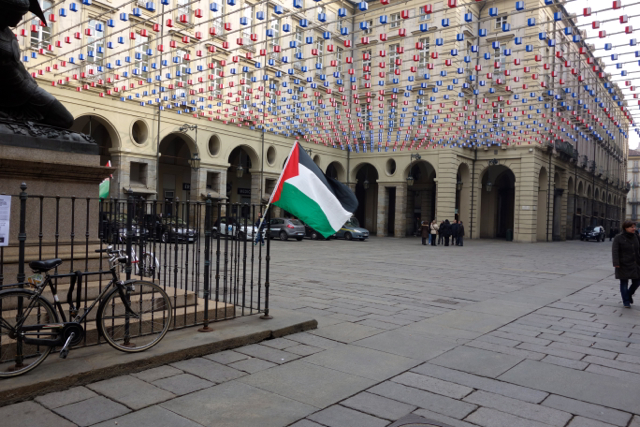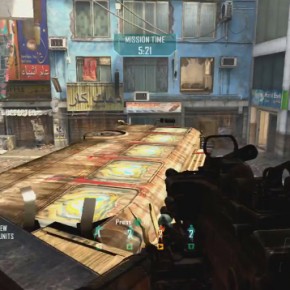Truer words are rarely spoken: “…the State of Israel is already a bi-national state – a state in which two nationalities reside, Jews and Arabs. The advocates of the establishment of a Palestinian state … simply oppose the addition of any more Arabs to the existing Arab population of the State of Israel. Lurking behind their pious slogan ‘two states for two peoples’ is their real, politically incorrect slogan: ‘Not one more Arab!’”
No, that’s not a Palestine solidarity activist or a Jewish anti-Zionist. Those words were written by Moshe Arens, former Israeli Defense Minister and mentor to Benjamin Netanyahu. Arens’ argument is, of course, far from an antiracist message, but that doesn’t mean it’s not accurate. Without naming it, Arens is supporting the ideology of Naftali Bennett and his HaBayit HaYehudi (Jewish Home) party.
Like Bennett, Arens stresses the “integration of the Arab minority,” and advocates the annexation of large parts of the West Bank and giving citizenship to the Palestinian population. And, in the tradition of political Zionism dating back to Theodor Herzl, Arens wishes to see the government engage in an expanded program of encouraging Jews around the world to immigrate to Israel.
Recognizing that, despite the histrionics of Diaspora fear-mongerer Abraham Foxman, anti-Semitism is not now or likely in the near future to be a sufficiently high threat to Jewish life to encourage mass Jewish emigration from the West, Arens says that Jews will be drawn by Israel’s economic prosperity, which offers them a standard of living as high or higher than what they enjoy abroad.
Really, Moshe? Would that be the Israel that has the highest poverty rate among OECD countries? The country that is seeing social protests, even as you pen such falsehoods, because of massive cuts to public spending? The country with growing income disparity that places it in the top five among developed countries? No. Arens’ dream of enticing Jews to Israel with promises of economic glory is even less likely to be realized than the end of Israel’s occupation of the West Bank. Israel is becoming a poor country.
Instead, what Arens’ idea is likely to produce is an ongoing two-tier system of citizenship. The notion that the “Arab minority” can be truly integrated into an Israel that has cantonized their fellow Palestinians in a smattering of strangled enclaves in the West Bank is pure fantasy. Palestinian citizens of Israel will become an increasingly alienated group, despite their own citizenship. The Palestinians of the West Bank are their own family members. Does Arens really believe that Israeli citizens who are Arab can be so easily bribed into ignoring the plight of their relatives and friends? Imagine if someone suggested such a thing about Jews.
All that being said, Arens is not wrong about the views of those who wish to continue to breathe life into the rotting corpse of the Oslo Accords. The late peace process was inspired by a basic theory, elaborated by Yitzhak Rabin in his 1992 electoral campaign: us here, them there. Separation was the byword, and this evolved over the years. In more recent days, the key motivating factor for reaching a resolution with the Palestinians was the “demographic time bomb.” It all comes back to the question of how to have a Jewish state with a minimal Arab population, the same question which filled the minds of Herzl, Ze’ev Jabotinsky, Chaim Weizmann, Josef Weitz, David Ben-Gurion and many other founding ideologues of various strains of Zionism.

The settler movement’s thinking is more straightforward, and Arens puts it out there quite clearly. His vision remains hypocritical, depending as it does on a vision of “integrated Israeli Arabs” who sell out their fellows for citizenship in Israel. But too much of the so-called left, both in Israel and among its supporters in the Diaspora, approaches the question with their own brand of hypocrisy.
The phrase “Jewish and democratic state” has become a byword, used with equal aplomb by such disparate figures and groups as J Street, Benjamin Netanyahu, and Barack Obama. But the phrase depends on a particular ethnocentric definition of a “Jewish state,” one which is fundamentally incompatible with democracy. It continues to empower Jews all over the world to have a stake in Israel while, in the most egalitarian formulation, cutting off whatever Arabs live in Israel from the rest of their culture, even family.
It can’t work, and it isn’t necessary. The state Zionism founded is Israel, and that founding, barring a cataclysmic development, will endure. It can and should be a democracy, but it cannot be that while it tries to enforce, through artificial means, a Jewish majority. That cannot reconcile itself to political democracy, because it is inherently anti-democratic, ideologically.
As I have argued before, the solution is a constitution which defines the state as the homeland of the Jewish-Israeli and Palestinian-Arab nations. This seems to open the door to a one-state solution, and in a sense it does. It certainly makes that option more feasible. But it does not necessitate it.
It may well be that two states will still come about. If Israel can abandon its need to enforce demography and favor Jews over non-Jews in both theory and practice, it can well expect a state of Palestine to do the same. This opens the possibility of Palestinian refugees returning to one of two states and of Jewish settlers remaining in the West Bank as citizens of Palestine.
But whether the formulation is one or two states seems a rather academic discussion right now. It has always seemed to me that these sorts of debates distract from the fundamental problem. Because whatever the formulation needs to be, it needs to be based on respect for universal rights for all in the region, as well as a recognition of the strong nationalist sentiment, and deep attachment to the land that exists on both sides. Yes, Israel, as the more powerful side, bears a much heavier burden of reparation and reform. But those principles hold for all.
Whether it is the anti-Semitic views of Hamas, or the “not one more Arab” view of the Tel Aviv mainstream, or the willingness to deprive Palestinians of rights espoused openly by the settlers, until such attitudes are pushed to the margins, there’ll be no peace. The comfort Israelis live in now is likely to have a short shelf life, as Arabs across the Middle East continue to challenge their governments. Much as many Israelis and their supporters try to deny it, the ongoing oppression of Palestinians is just as intolerable as the regimes overthrown during the Arab Spring. To this end, Bibi is just another Mubarak. That he happens to be Jewish is almost secondary.
Photographs courtesy of Joel Schalit





